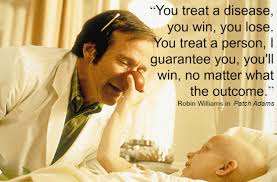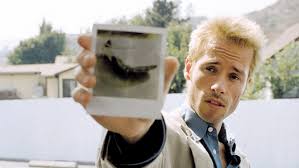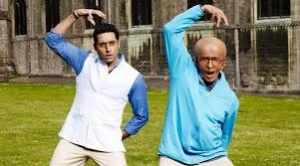Medicine in Film: An Insight Into the Brewing Emulsion
Cinema mirrors a country’s hopes, ideals, aspirations and expectations from itself. It can be safely said that cinema is among the more important concepts which often alters the way the world perceives a nation.
A clear case highlighting the same is America’s sophistication and world-dominance, although the seed for which may have been planted by a few real technological breakthroughs but by and large, it is an idea pollinated and drilled into the minds of gullible people the world over by the impossibly unrealistic movies that Hollywood is notorious for churning out. A nation’s cinema is thus often considered as a very reliable indicator of the status of the society in general, whether or not reality agrees with it.
The Basis For The Union : How The Two Met
The powers of cinema were not lost even on our ancestors. From the early days of romance and drama to the depiction of more poignant issues in later times pertaining to the daily afflictions of people such as terrorism and other illicit criminal activities like smuggling and drug abuse; cinema has indeed come a long way in its ability to transcend all barriers, enthralling audiences across ages and holding people in awe.
Apart from the IT boom which the past decades have witnessed, medicine is probably the only other field where major strides have been taken at a breakneck pace, sending shock waves and ripples through the field of science. Since ancient times, for ordinary men who would be expected to suffer from hippopotomonstrosesquippedaliophobia, which is the fear of long words(something which could be considered as routine with respect to complicated medical terminology), medicine was never a science. It was just a mystical miracle with its results often being considered magical, as something which was easily appreciated but not fully understood. The result of this continued adoration was that respect for its practitioners was often very high in a layman’s heart. This ensured that they often placed doctors on an equal pedestal as the Almighty himself.
The Early Days
So, it was eventually just a matter of time before two widely different ideas which struck awe among the common folk came together and we saw the advent of movies based on medicine. These ranged right from initial bit-roles being played by a doctor in the hero’s shadow to later full-blown depictions focusing solely on the practice of the art itself and many other aspects related to clinical expertise. Indeed, it’s been a long journey with a rich history which has transcended language barriers the world over.
The Current Scenario

Movies and television series covering almost all aspects of medical practice have been produced. Usually, with a student’s entry into medical prep school, there also occurs an informal introduction for him into the world of TV shows like House MD and ER. Then there are films which deal with the ethical dilemmas of medical practice ( John Q, Million Dollar Baby, One Flew Over The Cuckoo’s Nest) as also films such as Patch Adams and The King’s Speech which show how in spite of all the ground-breaking marvelous technological strides which we have taken and are proud of, the human touch is ultimately of paramount importance in clinical practice and that a unique approach may often yield unexpected rewards even in cases where all hope is otherwise lost. Films such as Concussion, Something The Lord Made, Awakenings and Extraordinary Measures depict the struggles and challenges often faced in life by those clinicians, who as a result of their research try to bring about a new perspective to medical practice either in the form of new treatment modalities or say, non-pharmacological options in therapy.
The Underdog Tales : Oscar Baits

There are countless films depicting the inspirational stories of people affected by severe disorders and how they battled on and won in spite of the seemingly insurmountable odds stacked against them. It is not surprising to note that such films, if done right, basically function as award-magnets and pocket numerous Oscars every year. Stellar examples of such work include My Left Foot (based on the eponymous book by Christy Brown), Rain Man (inspired from the real life story of Kim Peek), A Beautiful Mind (portraying the heartwarming story of the recently deceased Nobel Laureate John Nash) and I Am Sam (starring the evergreen Sean Penn in a mesmerizing role) to name a few.
An Interesting Take on Symptoms

Many released movies have had their entire premises based on the direct consequences of the actions of their diseased protagonists. Scratching the surface of this genre, one comes across such diverse films as Fight Club(insomnia), Finding Dory and Memento(anterograde amnesia), the Jason Bourne series(retrograde amnesia), Shutter Island (schizophrenia) and Pawn Sacrifice (paranoid delusional disorder) to name a few.
A Roller-coaster Ride of Human Emotions
Medicine and medical diagnosis invariably play a very key role in our lives. Hopes have been shattered, deepest secrets revealed and the real meaning of life often understood at a doctor’s clinic. The Fault In Our Stars,My Sister’s Keeper(dealing with issues of organ donation) Sweet November(about the effect fatal diagnoses have on our loved ones) among many other films deal with the way medicine toys with human emotions.
Lesser Known Flicks
Apart from these, there are also innumerable films which have medicine or med school as a backdrop. It may surprise the reader to know about films like Pathology, Gross Anatomy, Anatomy (This flick was supposedly considered good enough to even warrant a sequel: Anatomy 2) and Flatliners (starring such stalwarts as Julia Roberts, Kevin Bacon and Kiefer Sutherland).
Breaking Language Barriers

For those few who enjoy watching the more emotionally charged Indian films, even their industry is not far behind. They have produced films like Munnabhai MBBS (medical ethics), My Brother Nikhil (dealing with the social stigma of HIV), Paa (progeria), Ankur Arora Murder Case (medical jurisprudence), Barfi (differently-abled and autism), Black, Kartik calling Kartik (schizophrenia), Anand (lymphoma of the intestine: now, more correctly diagnosed as Non-Hodgkin’s MALT B-cell lymphoma), the biographical Dr. Prakash Baba Amte, Janma to name a few.
Even for the general masses, these make for a riveting watch thanks to the novelty of their concepts. In the coming days, we are sure to see many more such films grace the silver screen.
The Future
The power of the visual medium to leave a lasting impression should never be underestimated. It has been often observed that most people blindly believe what they see on-screen as ‘the gospel truth’ without even bothering to verify the facts. While many people are now aware about resuscitation skills in case of emergencies by virtue of both, efforts to spread awareness as well as an increased curiosity in utilizing medical knowledge as a tool to save life, an accurate technique is of great importance in these cases where people’s lives are at stake. While films like The Wolf Of Wall Street and Mrs. Doubtfire may have given a comedic twist to the Heimlich maneuver and others like Mission Impossible 3 and Casino Royale may have chosen to incorporate defibrillation as a plot device to heighten the suspense of various scenes, incorrect techniques like those demonstrated can lead to severe injuries like rib fractures which can further cause life-threatening complications.
Hence, it is of paramount importance that all medical professionals must be aware of the rights and wrongs being unknowingly preached and advocated among the public through movies. If used appropriately, they can become powerful tools in spreading awareness and information among people in whom it would otherwise prove to be a difficult, if not impossible task. Many intellectuals and social welfare organizations agree with this theory and make use of visual media (in the form of short films and presentations) to effectively get their point across and reach a very wide global audience.
The union of medicine and movies is an area of unlimited scope, bursting with limitless potential. This amalgamation can indeed make wonders happen, paving the way for a better and brighter future for our society. Together this field shows the promise of an exciting future.
What do you think? Leave a comment.











Memento was undoubtedly one of the most original and creative films I’ve ever seen.
I stumbled upon My Left Foot during a special pedagogy lesson in school. Daniel Day-Lewis is awesome!
YEAH! After watching The Left Foot, I have came to the conclusion that Daniel-Day Lewis the greatest actor alive and perhaps the greatest actor ever!
Because you discussed TV shows alongside films, I consider it a minor tragedy that the TV show Scrubs wasn’t mentioned. Scrubs is a comedy but has heart-warming moments, heart-breaking moments, and delves into all sorts of medical ethics. I think every kind of medical story or ethical dilemma you mentioned in your article was covered in Scrubs.
While I wholeheartedly agree with your point, my article was solely focussed on the depiction of medicine in films and I just happened to mention a couple of very popular shows that also dealt with the same. TV shows by virtue of their much longer run-times have the luxury to explore many issues with a depth that is not possible in films and as you rightly pointed out, shows like Scrubs can single-handedly cover many aspects of medicine. Besides, with the enormous number of medical TV shows that have been made, right from ‘Marcus Welby MD’ and ‘General Hospital’ from the 60s to perennial favourites like ‘Doogie Howser MD’, ‘Grey’s Anatomy’, ‘St. Elsewhere’ and even the more recent additions like ‘Emily Owens MD’, ‘The Knick’ and ‘Code Black’, I think that there is enough material here to warrant a separate article which could do justice to the same.
I could not figure out what Memento is trying to say for the first time I watched it. However, I knew these stories were narrated from the end for the second time and could narrowly understand the whole structure.
I haven’t seen Sweet November in along time but I do remember most of it.
I’ve got to admit, the beginning was a little funky and not exactly promising, but it gets warmer and warmer just like the colors of the leaves in November. (yes, that was cheesy).
Thank you for sticking till the end and giving the article a chance!:)
My Sisters Keeper is a very emotional, touching film.
Let’s face it, some books are better not having film adaptations. This is no exception. The screenplay’s a mess.
Could you be a bit more specific Glennis? I cannot understand from your comment which film you are talking about…
I’ll just say it: this movie is pretty boring.
Which movie are you referring to Tom, I do not think that it could be Memento…
Please specify. However, I do agree that occasionally some medical films if not done right may seem a bit boring to the audience at large.
To be realistic, After watching Memento, i began to look for the differences between Jonathan Nolan and Einstein yeah it’s true, also that movie made me in love with Nolan for the first time.
The concept of ‘playing God’ has been a staple of science-fiction and the sci-fi horror genre ever since Mary Shelley’s “Frankenstein” was published. Really evident in Flatliners.
Flatliners is such a cult classic.
Not going to lie – I definitely clicked this article because of its photo, but this article was a pleasant surprise. I really like the variety of films you have looked at, from blockbusters to lesser-known films to non-American films. A lot of the films here I’ve never heard of or watched, so it’s definitely made me curious to watch them at a later date.
However, I do wish you added more analysis to various films – perhaps pick 1 major film from each category and analyze it – instead of just listing a few relevant ones here and there. I’m wondering if someone could perhaps take inspiration from this and write an article with a more narrowed focus on a particular category you listed here (the interesting takes on symptoms, for example) or even on one particular film.
Still, great article!
Thank you Karen. Indeed, the topic was very vast and it was my humble attempt to put forth all aspects of the idea without going into too much unnecessary detail. Further articles inspired from the various facets of this piece are always welcome.
An interesting overview of medical subject matter and discourse in film. The introduction was a bit of a reach though, you could have certainly pushed the point of America’s drug dependency and insurance controversy more. I am wondering where you’re getting this theory of film and its relation to nation-state control/ power. Its an interesting point I wish you would’ve brought in a scholarly source or something like that.
I love how you linked the article to Paa and Black. Genius connection. I enjoyed your article as I never and I do mean never watch any medical shows or films. The closest I have gotten was the movie Face/Off where Nicholas Cage and Johne Travolta traded faces.
Anyway, a very nice article on an unusual topic. Looking forward to reading mor from you!
Thank you so much. Unlike before, it is a matter of pride that Indian films now are tackling an increased number of topical, relevant and often uncomfortable issues. Makes for interesting viewing!
Face/Off indeed had a very interesting premise and like you yourself pointed out, though the medicine was shoddy at best, it was still a very entertaining film.
An interesting and thought provoking article and I’m pleased to see that you also looked at films outside of the mainstream Hollywood output as well as foreign language films. With reference to Progeria in particular, there is an excellent Korean comedy/drama entitled ‘My Brilliant Life’ (2014), based on the novel ‘Doogeundoogeun Nae Insaeng’ by Kim Ae-Ran, that deals with this disease in a superb way. I’d recommend it to anyone, especially for the finely balanced and mature performance from the young, Jo Sung-Mok, who plays A-Reum, the boy with the disease. Thanks once again for your article. Much appreciated.